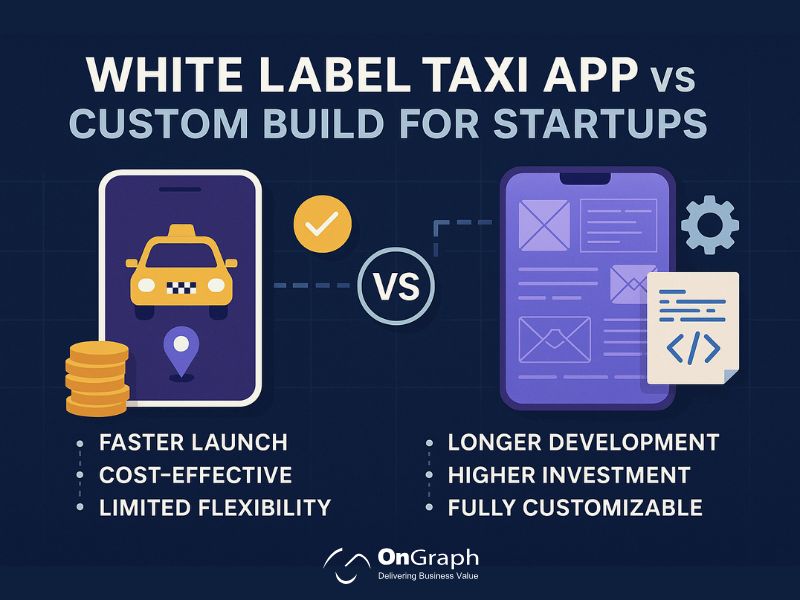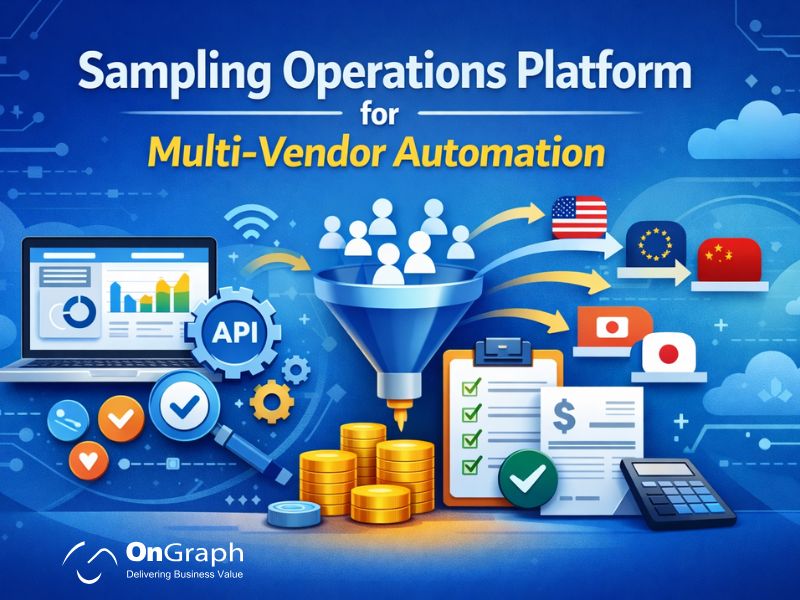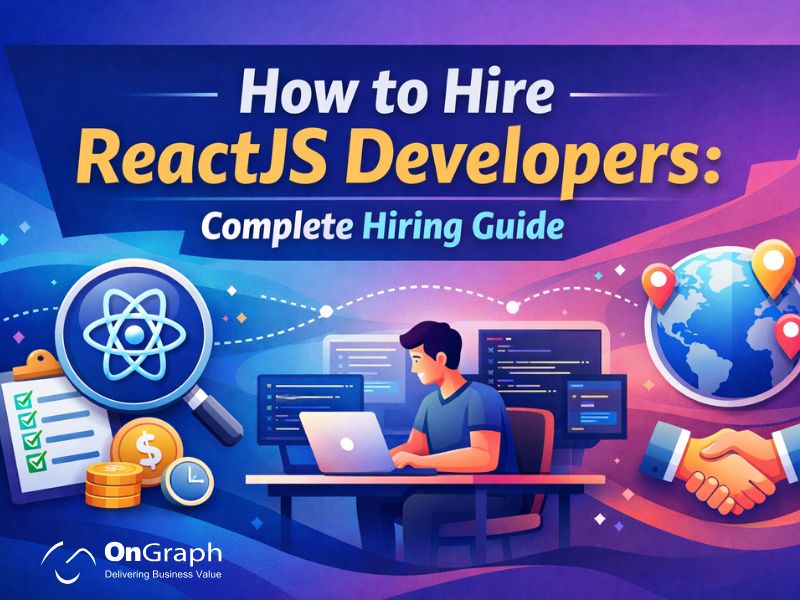In this article
- Why Choosing the Right Approach Matters?
- What Is a White Label Ride Sharing Solution?
- What Is Custom Taxi App Development?
- White Label Taxi App vs Custom Build for Startups: Key Differences
- Case Studies and Real-World Examples
- When Should Startups Choose a White Label Taxi App?
- When Should Startups Choose a Custom-Built Solution?
- The Final Thought: White Label Taxi App vs Custom Build for Startups
Launching a ride-hailing business today requires a smart decision between two approaches. The question “white label taxi app vs custom build for startups” is now a critical choice that affects cost, time-to-market, and long-term scalability. Startups must choose wisely because the ride-hailing market is highly competitive and fast-moving.
Global mobility platforms continue to grow fast. Statista reports that the ride-hailing market will reach US$330 billion by 2028, driven by urbanization and demand for safe mobility.
This rapid growth opens opportunities for new brands offering localized solutions such as women-only fleets, bike taxis, scooter rides, or multi-service platforms.
This guide compares both approaches in detail. It covers cost, timelines, scalability, maintenance, and real examples to help startups make an informed decision. You will also learn how a ready-made taxi app solution can reduce launch time to just weeks.
Why Choosing the Right Approach Matters?
Startups often struggle with unclear budgets and long development cycles. Many teams explore Uber clone app development to reduce risk and deploy faster.
Others choose full custom taxi app development to support unique business models. Both paths offer benefits, but the choice depends on your target market, service complexity, and required features.
The comparison below covers key decision factors that influence long-term success.
What Is a White Label Ride Sharing Solution?
A white label ride sharing solution is a pre-built taxi application designed to be rebranded for any taxi or mobility startup. It includes rider apps, driver apps, and a complete admin dashboard.
You can add your brand name, colors, pricing rules, and operational workflows without building the system from scratch.
Core elements usually included:
- Rider app (Android and iOS)
- Driver app (Android and iOS)
- Web-based admin panel
- Dispatcher panel
- Wallet, cash, and card payments
- GPS tracking and maps
- SOS and safety features
- Push notifications
- Region-wise pricing
- Ride history and invoices
- Chat between rider and driver
These pre-built systems are tested, stable, and optimized for real-world use. They are ideal for startups that want faster deployment and predictable cost structures.
Launch Your Taxi App Faster—Get Expert Guidance on the Right Development Approach
What Is Custom Taxi App Development?
Custom taxi app development means building your entire ride-hailing app from the ground up. Every feature is designed and developed according to your business logic. Custom apps offer full control but require larger budgets and long development cycles.
Typical features built from scratch include:
- Unique ride types
- Custom payment integrations
- Multi-service modules
- Driver verification workflows
- Route optimization
- AI-powered dispatch systems
- Corporate ride management
- Loyalty or subscription modules
A custom solution suits startups with innovative ideas or complex workflows that cannot be supported by ready-made systems.
White Label Taxi App vs Custom Build for Startups: Key Differences
This section contains the most detailed comparison to help you understand the real impact on time, budget, and scalability.
1. Development Time
White Label Solution
- Ready to deploy in 4–6 weeks
- Branding, payment setup, and launch happen quickly
- Ideal for competitive markets where timing matters
Custom Build
- Development requires 6–12 months
- Testing and security audits add more time
- Not suitable if you must launch before competitors
Conclusion:
If time-to-market is critical, white label wins.
2. Taxi App Development Cost
White Label Solution
- One-time licensing fee
- Typically between $4,000 and $25,000 depending on features
- Customizations are billed separately
- Predictable budget with low risk
Custom Build
- Development cost ranges from $80,000 to $250,000+
- Requires backend, frontend, DevOps, QA, deployment, and maintenance teams
- Higher cost because everything is developed from scratch
Conclusion:
White label is cost-efficient for early-stage startups. Custom is suitable only for funded companies.
Also read- Taxi App Development Cost in 2025: Full Budget Guide
3. Features and UX Capabilities
White Label
Comes with predefined Taxi App Features similar to leading apps:
- Real-time tracking
- Driver availability management
- Fare estimation
- In-app chat
- SOS
- Ratings and feedback
- Wallet and cash payments
Startups can request additional features, but core UX is already optimized.
Custom Build
Offers unlimited feature innovation:
- Multi-country tax rules
- Women-only fleets
- Scooter-only ride categories
- AI-based fraud detection
- Corporate billing workflows
Conclusion:
Custom is ideal for unique use cases. White label is perfect for standardized ride-hailing models.
4. Scalability and Future Expansion
White Label Systems
- Scalable enough for city or regional launches
- Suitable for early-stage startups
- Custom upgrades can be added later
- Multi-service can be added in phases
Custom Build
- Supports large-scale enterprise operations
- Ideal for multi-country expansion or complex business models
Conclusion:
Both scale well, but custom is better for heavy data loads and multi-service super apps.
5. Maintenance and Support
White Label
- Comes with post-launch support
- Upgrades happen faster
- The platform is already tested in real markets
Custom Build
- You maintain your own engineering team
- Requires regular security patches
- Higher long-term cost
Conclusion:
White label reduces operational burden for new founders.
6. Risk and Reliability
White Label
- Lower risk due to pre-tested modules
- Fewer bugs because system is already stable
- Faster approval in app stores
Custom Build
- Higher risk due to unknown bugs
- Requires long debugging cycles
- Longer app store review times
Conclusion:
White label is safer for early-stage businesses.
Case Studies and Real-World Examples
Case Study 1: Southeast Asian Bike Taxi Startup
A mobility startup launched a bike taxi service in a crowded city. The founders used a ready-made taxi app solution and deployed in five weeks. Results after launch:
- Reduced development costs by 80%
- Acquired 200 drivers in the first month
- Gained traction due to fast launch time
- Added local wallet integration within two weeks
Case Study 2: Middle Eastern Super App
A regional operator needed a multi-service platform including rides, parcel delivery, and car rentals. They selected custom taxi app development because the app needed unique modules. Results:
- Build time: 14 months
- Cost: More than $150,000
- App now serves over 30,000 users
- Custom workflow improved fleet automation
When Should Startups Choose a White Label Taxi App?
Choose white label when:
- You want to launch fast
- You need predictable pricing
- Your business model is not highly complex
- You want a proven system to reduce risk
- You want to test the market with a low investment
- You need a basic Uber-like app with core features
White label solutions are ideal for:
- City-based taxi startups
- Bike taxi and scooter taxi services
- Women-only ride-hailing services
- Airport shuttle companies
- Car rental operators
- Regional mobility companies
When Should Startups Choose a Custom-Built Solution?
Choose custom build when:
- You have a unique business model
- You need deep integration with external services
- Your app requires AI-powered dispatch systems
- You plan a multi-service super app
- You have long-term funding
- Your project requires enterprise-grade scalability
Custom apps suit:
- National mobility brands
- Logistics and transport enterprises
- Multi-city franchise platforms
- Corporations needing internal ride systems
The Final Thought: White Label Taxi App vs Custom Build for Startups
For most early-stage founders, a white label solution offers speed, lower cost, and reduced risk. Custom development is powerful but expensive and time-consuming.
Many startups launch with white label apps and later shift to custom builds once they validate their business model.
The white label taxi app vs custom build for startups debate depends on budget, time, and scalability. Use this comparison to choose the best path for your mobility business.
FAQs
White label is best for most new startups. It reduces cost and ensures fast launch. Custom builds suit funded companies with unique workflows.
Launch time is usually 4–6 weeks. This includes branding, payment setup, and app store submission.
A custom build ranges from $80,000 to $250,000+ depending on features, platforms, and backend complexity.
Yes. You can add new modules, payment methods, ride categories, and UI changes. Customization cost depends on complexity.
Yes. Platforms can integrate wallets like bKash, Stripe, PayPal, or regional payment systems.
Yes. You can scale across cities and countries. Many operators begin with white label and expand later.
Key features include GPS tracking, pricing control, SOS, driver KYC, multi-payment support, and an intuitive admin dashboard.
About the Author
Let’s Create Something Great Together!
Latest Blog
















